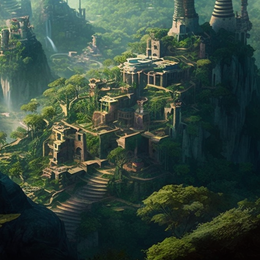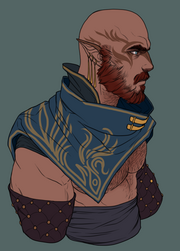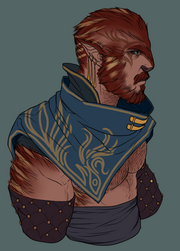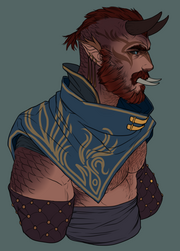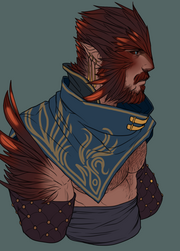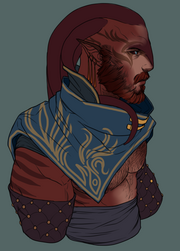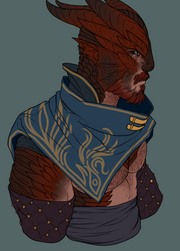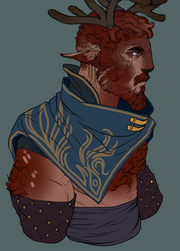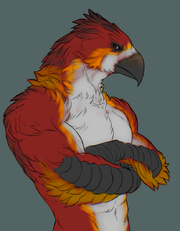Maquixtl
| Maquixtl | |
|---|---|
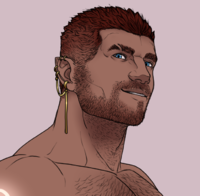 | |
| Race | |
| Pronunciation | Ma-kwee-still |
| Classification | Magus |
| Common Nicknames |
|
| Languages | Saan, which is based on real-life Nahuatl. |
| Racial Traits | |
| Distinctions | Democratic and whimsy fact-focused Elves that use science and co-habit with the Yanar. |
| Maximum Age | 500 |
| Height | Tall for Avantl, average for Huactl, short for Xieloth. |
| Eye Colors | Any shade of blue or green is common, brown rarely. |
| Hair Colors | Black, Blonde, Auburn (very common), Brown, Caramel (very common), Dusty Blonde (very common). |
| Skin Tones |
|
The Maquixtl (pronounced Ma-kwee-still, sometimes called Maquis by the Ailor) are a Race of Elves. Once having been part of the Allorn Empire, some time before its collapse, a large cult followed their leader Suel to the lands far west. The exact history that followed has mostly been obscured from the world, but in the remnants of the poisoned jungles of Guldar, the Maquixtl created a vast civilization fusing Elven elements with the ruins of the cultures that had existed there before their arrival. Rejecting the Elven obsession with Magic for a more balanced approach, the Maquixtl are renowned for their ability to edit Genos, the very substance that makes up mortals. Over the centuries, the Maquixtl re-colonized abandoned parts of the Allorn Empire, while also on-boarding many Yanar who felt marginalized in Allorn society. To this day, most Maquixtl remain in Guldar, scattered across mountain-peak city-states shrouded in treetop canopies while others have returned to their former homeland of Daen.
Core Identity
The Maquixtl are a Race of outcast Elves who usurped the Mesoamerican inspired remnants of the Avarr civilization in Guldar, and built a whole new civilization on top of it. Unlike the other Elven societies, they are democratic and communal rather than taking orders from a single leader. Maquixtl are ageless: they look young forever, even into old age, but can choose to look older inside of adult age ranges.
Allorn Memories
The Maquixtl originated as a persecuted group in the Allorn Empire, hunted down by Archmages and government agents as abominations. Their founder Suel was targeted as a dangerous radical who preached anti-Allorn sentiment, due to his experimentation with Genos (the Teledden considered themselves already perfect), and ideas that Elven society would be better off without relying on Magic. While Magic has seeped back into Maquixtl society and is used heavily by the Xieloth, this has not been forgotten. Even though the Maquixtl acknowledge the Allorn Empire as the greatest Nelfin state of history, and respect Talea’s message and the Estellon religion that led to its power, they remember where they came from, and are quick to call out Allorn supporters on their evil and hypocrisy. The Maquixtl additionally refuse to acknowledge the returned Talea as real, calling her The Second or The Imposter instead of using her name, and suggest that she is a Demon sent to lead the Elves astray. As a result, some of the Plains Maquixtl and their allies have been expunged from the borders of the Allorn Empire, settling in nearby lands as well as southern Corontium.
Genos
Rather than Magic, most Maquixtl rely on power that has been given to them through manipulation of their Genos. Their ability to control the air pressure around them, for example, results from genetic editing designed by Suel. The Maquixtl are a very physically proud society who value brute power and strong bodies as an expression of the mortal form: even the little Xieloth gardeners who tend to their sheep are good long-distance runners. Where Magic is accepted, is as a tool to do things that the body never can. Both Xieloth and Yanar, who are considered friends of the Maquixtl, use it frequently to encourage the plants to grow better harvests, rapidly raise buildings that would take laborers weeks, clear rock slides, and more.
Respect Our Privacy
The Maquixtl do not like sharing their secrets. While they can be found in most lands where the Allorn Empire once ruled, their main continent of Guldar is shrouded in a poisonous mist that kills those without their genetic protections. As they fled to Guldar in large part to escape the outside world, talking too much about it is considered inviting the outside world back in, and so they are usually cagey and obscure about their place of origin. Maquixtl who were born outside of Guldar do not have the context of the wind-powered Avantl citadels or the volcanic mountain passageways tunneled through cliffsides, so this does not apply to them so much, as there is nothing to hide. Most importantly, the Maquixtl are not interested in the idea that someday others might figure out how to safely access Guldar and bother them there, as they like having it to themselves.
Castes
Maquixtl are physiologically split into three subraces: the large Avantl warriors, the small Xieloth civilians, and the Huactl who float in between. They do not have a hard social caste system per-say, but each of these subraces tend to gravitate towards the tasks that they are most suited towards. It would be odd to find a Xieloth soldier, for example, who was involved beyond scouting or medic work. Avantl are by far the largest, the most rugged and wide. Regardless of their religious alignment, very few of them are Mages. Xieloth are usually little and lithe, more like the Teledden that the Maquixtl originated from. Magic is quite frequent among them to make up for this lack of strength, and they together with the Yanar are the acceptable users of Magic in Maquixtl society. Huactl are an in-between category, the average of the other two, and can be used for whatever flexible role desired (though never as committed).
Design
Cultures
The Maquixtl are split population-wise between two regions, Guldar and the Plains of central Daen. While they still share much in the way of culture, the Guldar Maquixtl are more Mesoamerican in design and more influenced by the Avarr, while the Plains Maquixtl are more Elven in design and retain some Allorn styling (though more agrarian and simple).
|
|
Racial Abilities & Specials
Racial Abilities are generally a set of unique powers and effects that all peoples of that Race all innately have, while Specials are more passive, aesthetic focused capabilities. Specials are defined per-page, while Abilities can be searched on the Ability List page to determine their generic function. Maquixtl have mostly Specials with some Abilities tied in, themed around the various gene-edit transformations they have learned to use to their advantage.
Specials
- Ageless: The Maquixtl are Ageless, when they become adults, they cease to visually age. Additionally, they can change their age-based appearance to any Ailor age equivalent they want (so long as it is 18+).
- Body Reading: The Maquixtl can read someone's emotion even if they are suppressing it, purely by looking at them. They can also make their own emotions unreadable by any Ability or Special in turn, even Maquixtl.
- Biolumin: The Maquixtl have glow pigment control of their skin, able to glow any part of their body (including hair or tattoos only) with any color and any intensity, even to light up a small area in a dark room.
- Homehappy: The Maquixtl can have pets who live unnaturally long lives, due to the special care the Maquixtl give them. They can also clearly tell an animal's mood at a glance, regardless of familiarity with them.
- Cleanseskin: The Maquixtl have extremely useful skin that can rapidly absorb pollutants, dirt, and smells from objects and even liquids with mere physical touch, like a brush and soap but without the heavy scrub.
- Guldarin: The Maquixtl are immune to the (magical) poisonous mist that hangs over the Guldar continent, thus allowing them to travel to it in Progressions. They are also immune to paralyzing snake venom.
- Homebrew: The Maquixtl are able to control the environment in their Rental/Estate/Base, controlling humidity and temperature to create an indoor jungle or tropics, allowing wild plant growth and flourishing.
- Yanarin: Given Yanar Genos by their most fervent allies, the Maquixtl can sustain branches, moss, flowers and plant life on their body as aesthetics, and maintain them between Genos forms.
- Windcraft: The Maquixtl can graft items that they have collected on their journeys into their homes, such as statuettes into support beams, and wood carvings into plaster wall, binding them so they fuse.
- Tailgift: The Maquixtl can manifest a tail inspired by the various Genos forms (Cat, Pig, Falcon, Dragon, Shark, Deer) which is prehensile (if long enough) but cannot be used in combat roleplay in any form.
- Genosser: The Maquixtl can manifest small parts of their Genos States, for example just a grouping of feathers behind the ear (Avarr Genos) or a set of gills on their neck (Moloq) on their Cleanslate State.
Genos Editing
The Maquixtl have an Ability called Genos Editing, which allows them to apply a limited transformation to their body that converts about 50% of the visual aspects and aesthetics with Genos Mutations. This is an actual Transformation that has to take place, though it is instant. When Transformed, the Maquixtl is stuck with said Transformation for 48 hours, though may choose to retain it permanently (exception for Avarr Unity which is 7 days). Genos States cannot be mixed, though it is possible to move from one State to another so long as the Cooldown is respected, without having to go through Cleanslate State. The Abilities and Specials gained from a Genos State should not be written onto the Character Application, nor should their chosen State be. Specials and Abilities gained in a Genos State are only valid so long as the Maquixtl is in that state. Maquixtl Gene Editing and switching is very normal in Maquixtl society, and many of them even permanently live in particular Genos States.
|
Maquixtl Genos States | ||
|---|---|---|
|
Cleanslate Maquixtl Genos State | ||
| ||
|
Stalker Maquixtl Genos State | ||
| ||
|
Barroth Maquixtl Genos State | ||
| ||
|
Avarr Maquixtl Genos State | ||
| ||
|
Moloq Maquixtl Genos State | ||
| ||
|
Wyvern Maquixtl Genos State | ||
| ||
|
Springbok Maquixtl Genos State | ||
| ||
|
Avarr Unity Genos State | ||
| ||
Avarr Souls
The Maquixtl in Guldar practice a ritual called Totonal Avarr in which the Maquixtl consents to carrying the soul imprint of an Avarr. Avarr civilization ended centuries ago under mysterious circumstances, but somehow, the soul imprints of tens of thousands of Avarr survived in Soul Lockets. A Maquixtl who undergoes the Totonal Avarr ritual consents to carrying the soul of a long dead Avarr in their body, thus sharing their body between two souls, their own and the Avarr. The Maquixtl who carry on the legacy of the Avarr, having adopted their language, architecture and artistic expressions, consider this carrying of the souls a challenge their people must face up to, to atone for past sins, and to compensate the Avarr for using part of their cultural heritage. The Maquixtl believe that the Allorn Empire eradicated the Avarr Race, and that by carrying the souls of the dead, the Maquixtl atone for their ancestor's sins. Avarr souls are not complete, that is to say, there is enough to form a personality, but the Avarr themselves do not have any memories of their past life, or what life inside the Soul Locket felt like. All they have left is vague likes and dislikes about art, fashion, Races, behavior and actions. It does not bring any additional skills or Abilities to the table, it merely has a personality and rough understanding of what Avarr society was like through which to judge modern societies.
At all times, the Maquixtl who underwent the ritual can communicate with the Avarr in their head, though the Avarr can also be permitted to speak through them. Some Maquixtl and Avarr become friends, though most Maquixtl consider the Avarr a challenge to be carried, as the Avarr had quite a power-driven and honor-focused culture where combat was an often preferred manner of settling disputes. As such, to many Maquixtl, a opposites clash-like situation occurs, where the Maquixtl is in control of their body most of the time, but the Avarr can also randomly take control, or take control during specific situations of heightened emotional duress or stress. Avarr personalities are usually flamboyant, bombastic, loud, domineering, prideful and vain. As they were once nine feet tall terror bird-like humanoids, most Avarr consider the host of a Xieloth to be an insult, though will still enjoy being alive again even if it has to be through the body of what they consider an inferior specimen. Avantl and Avarr are usually more in sync, which is why most Avantl warriors carry an Avarr Soul. This also had advantages in that Avarr were once fierce warriors who showed supreme bravery and never second guessed themselves, thus resulting in a culture of letting the Avarr take control during battle in Maquixtl armies.
Despite the opportunity of Avarr to, in theory, revive their culture by just usurping the Maquixtl bodies and re-establishing their domain, there is a more cooperative nuance between them and the Maquixtl. They are eternally fascinated by the Maquixtl scientific inquiries and curious mind, and are honored and pleased that the Maquixtl would bring homage to their culture and their memory by giving them another sunset to enjoy long after they all perished, when feasibly, the Maquixtl could have just erased their souls and ignored their Soul Lockets. Even though the Avarr may berate, insult, criticize and mock their host, get into arguments with them, or forcibly take control over their body without the host's consent, at the end of the day, both Souls work together for the benefit of the host body, and they both have an unspoken respect for one another. This does however not stop the Avarr from doing horrible things with the Maquixtl's hands, and the Maquixtl having to struggle with the implications of their actions afterwards. Once an Avarr Soul is bound to a Maquixtl, it cannot be removed. The Avarr soul is also played by the Maquixtl player, and the only visible way anyone can tell an Avarr soul is in full control of a Maquixtl body, is if the eyes become blood-shot, which is a sign of the Avarr forcing its way out.
Language
The Maquixtl language, Saan, is derived from the wider Allorn languages, but is so full of loan-words from Avarr that it has become completely unintelligible. While its most basic words are still Elven in nature, many nouns, place names, and complex verbs are Avarr (Nahuatl), with the influence only increasing over the centuries due to Maquixtl isolation. Even the Plainsfolk have caught onto this method of talking, influenced by the continued diaspora from Guldar, though many of them also end up learning Allorn to converse with those nearest them. Despite taking on Avarr speaking customs, the Maquixtl retain a simplified version of Elven naming customs - first, sometimes middle, and last name, with the placename dropped since they identify their place of birth in other ways.
- A list of Maquixtl male coded names: Yaotl, Omacatl, Itzcuin, Pantli, Tlapoca, Tenoch, Telpoch, Acopa, Milli, Xochihua, Itzmalli, Tonal, in general Nahua first names.
- A list of Maquixtl female coded names: Necahual, Ocoxochi, Centehua, Xochitl, Cecihuatl, Xoco, Ameyalli, in general Nahua first names.
- Maquixtl middle names are more Elven sounding while their first names sound more Avarr, some example: Menaar, Essalaïs, Milaen, Lanvaal, Salaëlle, Solayë, Visala, Missaal etc.
Elven naming is always complicated, so players are always invited to inquire in the Discord Ticket Bot to have the Lore writers check over a name (as many also speak different languages and can pick out silly syllables).
Religion
Maquixtl are very religiously divided. Their city-states each dedicate themselves to one particular religion, divided between Estellon (with Avantl centered around Ghilland and Xieloth centered around Mana), Dragon Worship (wholly Avantl city-states usually follow Caius in Dragon Worship), and Estelsoor (city-states with many Huactl usually lean Estelsoor). The nobility of that city-state dedicates itself to the protection of its chosen religion and its people who follow it, making some of the frequent city-state warring have a religious air. This does not devolve into all-out civil war between the Magic-hating Caius worshipers and the Magic-positive Estellon worshipers because the Caius priests at the top have made a concerted effort to declare other Maquixtl off-limits for Mage purges, which is working for the time being.
The colonies in Daen, on the Plains, are usually Estellon worshipers because of the cultural influence of the Yanar, Teledden, Fin’ullen, and others surrounding them. Like their cousins in Guldar, they focus on Ghilland for the Avantl and Mana for the Xieloth, although there is Elleyon worship present also where more Allorn influences are present. The Daen Maquixtl have a very rural interpretation of Estellon, preferring trees and groves as temples instead of the opulent grand galleries of the Teledden, claiming that this is closer to the original way their ancestors gave prayer, and that they keep the ancient methods alive.
History
The Maquixtl are the personal creations and in some senses children of the scientist Suel, a powerful and charismatic figure of the late Allorn Empire. Preaching the need for Elves to escape their crippling reliance on Magic, and preaching that the decadent and wasteful Allorn culture would soon drive itself into a dead end, he chased ancient lore and secrets in an attempt to splice the Genos of the Teledden Race and create mortals capable of improving their own physical composition. At his encampment on the Ularen Plains in the center of the Empire, with the support of some dissident Allorn Princes and some armies to both protect him and experiment on, he made strides towards developing what would later become the Maquixtl in the face of increasing persecution and hatred from mainstream Allorn society. Eventually, when he believed that the situation was untenable, he raised his supporters and made for the far western continent of Guldar, having a few tricks up his sleeve to survive its toxic atmosphere. It remains unclear how Suel knew of Guldar, or that the land was now barren of its Avarr and Eronidas inhabitants. When Suel’s cult came upon the ruins of the Avarr civilization there, they were taken by its beauty, and under Suel’s orders adopted large parts of its culture including its language and architecture to atone for what they believed was the Allorn sin of having wiped them out (as this was the only power they could conceive would have had such strength). Since then, and Cataclysm, there has been some limited reverse Maquixtl colonization of Daen to create the Plainsfolk, but as an isolationist people the Maquixtl are very unchanging and do not attempt to exert a force on geopolitics as a whole.
Society
Maquixtl in both the Plains and Guldar tend to make raising children a group activity, albeit for different reasons and in different ways. For the Iuiletl, having a child is monitored by the state and nobility, and all pairings that result in children must be pre-approved to be certain that the child is up to standard in terms of Genos. This often means that marriages between different subraces are rejected. Shortly after being born, when safe to do so, the child is put to training and intensive learning, as to be certain they remain at the same level as their peers. In the Plains, there are no such restrictions on children and all are raised communally by the settlement as a whole, encouraged toward what interests they may show and still kept in frequent contact with their biological parents. Colonies do tend to split children based on subrace, though, under the idea that an Avantl warrior would do best raised around other warriors, and a Xieloth farmer would learn more surrounded by peers of the same skill. This leads to many cross-subrace siblings being disconnected in later life, having spent their entire childhoods separate.
Later years for Maquixtl are defined completely by societal duty. City-states request that every individual strive to act with their absolute best in whatever field they choose to specify in, something which is pushed for through immense social pressure by government and usually even family. Leisure is not unheard of, but is usually found in rest days of training or otherwise productive hobbies, where it is easy to still compete with others. Plainsfolk believe in the same idea of duty to their fellows, as colonies religiously push the idea of everyone doing their own part and having their own role, which they must fulfill for everything to function properly and safely. Plainsfolk work mostly through bartering rather than standardized currency, and most supply themselves with food by the colony’s shared farms. The exception to this is any form of village protection, which doesn’t give much in terms of supply but is invaluable in providing safety for the settlement, and are thereby paid for their hours by supply of equipment and food. Maquixtl city-states are led by noble councils of various faiths and castes. Their villages are helmed by elder Maquixtl who in turn report back to the nobles in Guldar, as each settlement is still considered a colony.
Maquixtl in the homeland and in the colonies have no standardized gender roles. Allorn heritage means they have an understanding of the concept but they are otherwise apathetic to it or its presentation. Duty to state or settlement is not defined by gender in any form. Maquixtl romance is one of the few things state or faith does little to define or standardize. In the city-states, the process of reproduction is monitored and marriages may only be standardized if the resulting child would have good quality Genos. But the same weight is not placed on marriage, and so Maquixtl frequently find romantic interest in partners that they would never be allowed to marry. In the plains, restrictions on marriage do not exist, and moreover marriage itself does not exist, so romance is a loose affair. It is expected that a community loves each other in a very familial way though, on account of being raised together, so plains Maquixtl have a tendency to look outside of their villages when pursuing romantic endeavors.
World View
- It is a deep cultural taboo to ridicule a Genos state, or to insult another Maquixtl for their choice of Genos state, excluding cleanslate, which is considered free game.
- The Avantl have famous warrior lodges, militant monastic orders that are comparable to Regalian knighthood in their scope. Naming themselves after the creatures of the jungle, these Brotherhoods are extensively well armed and trained, and a force to be feared.
- Maquixtl internal warfare is quite ritualized. The purpose is never to debilitate opposing city states by hurting their adult male population, but instead to demonstrate superior strength and get a social victory. They could even be compared to mass spars or bloodsports.
- Maquixtl have a very extensive education system, especially at the higher level, based on patronage. Master-student relationships are very strong, and the close friendships formed between teachers and their three to four acolytes goes an entire lifetime.
- Maquixtl architecture and design is unlike anything else in the world. Combining Avarr pyramids, hanging gardens and open archways with an Elven sense of grandeur, chiseled carvings and statues, the great cities of Guldar are the topic of much mystique among Regalian so-called Occidentalist painters, who are an entire movement dedicated to the admiration of Elven works.
- The Maquixtl are quite close with the Yanar, who they are able to bring to Guldar with them. Especially the Xieloth, who see in them kindred spirits, do the best they can to keep a few Yanar in their vicinity to hang around with since they are so close.
- Maquixtl are unrivaled as concerns making barbecues. The fires of Mount Vestor itself come alive when an old Avantl uncle starts up a grill and asks for the set of skewers. Steak skewers smothered in every kind of chili imaginable and an aftertaste of lime are the most famous Maquixtl culinary export, and much sought after in general.
- The Maquixtl love feasts as a social event. For Xieloth, the act of cooking is a bonding experience and many communal kitchens are set both within Guldar and in plains colonies. Villages especially enjoy using feasts as a way to spread local gossip, or engage in scheming.
- Avantl Archon have a close bond with their Wyverns. They in fact have style competitions centered around showing that their Wyvern Genos form is close in appearance to their actual Wyvern, with an entire respected panel of elders to judge their aesthetic similarity. This fortunately does not disturb their Wyvern Mounts.
- Avantl Archon consider it a necessary pilgrimage to summit the approaches of Mount Vestor, the volcanic home of Caius, at least once in their lifetimes. It is called “making the ash,” with a ritual at the end where the warrior dirties their forehead with the soot of Caius’ mountain and returns home without washing it off, to prove that they have stood where he stood.
- Maquixtl alternate between using metal and sharpened obsidian weapons. The former for regular armed conflict, usually spear and shield but sometimes chopping sword or axe, the latter for more ceremonial purposes, usually clubs with sharpened pieces bound between wooden slats.
- The Maquixtl founder Suel is considered the closest thing Guldar has to a single authority, but is otherwise disinterested with rulership to the point where his massive theoretical power is never used.
- There is a loud minority of Maquixtl that are complete splicing fanatics, that aim to push for faster evolution via riskier experimentation and full discarding of the cleanslate.
- Plainsfolk have removed capital punishment from their society, and have replaced it with exile. Names, faces and crimes of exiles are quickly spread through the many villages and sometimes even to Guldar, to assure they cannot return to any facet of society.
- Maquixtl do not just compete by combat, and have a love for competitive sports between city-states and settlements. These are usually lifted from other cultures with some modifications to the rules to allow for complete use of Genos States, creating games that are as alien as they are explosive.
- Plainsfolk settlements are often founded with a sapling in the colony’s center, which grows with the colony. These Great Trees become social grounds for the community, and their fruit a part of each feast.
- Many adventurers attempt to use masks or suits to enter Guldar, only to perish shortly after exposure to its toxic air. Aquatic Maquixtl sometimes pick this fallen equipment off the shoreline as souvenirs.
- Xieloth and Huactl adore wind instruments, and frequently engage in their use.
- Younger Plainsfolk are encouraged to soul search early in life, and many end up stepping out from their villages to engage in adventure and discovery in greater Daen, or in the greater world.
- Due to their nature as intermediaries in the lucrative Daen overland trade between the Teledden and Ailor states, the Plainsfolk often can be found staffing the log-cabin trading posts that are raised to keep the roads safer and give travelers a place to rest themselves.
- The Maquixtl and Eronidas do not get along, as the Maquis often deny any Eronidas remnant or indication of their presence in the continent, while the Eronidas are often unhappy to learn their ancient homeland has been occupied again. Before the reformation of the Allorn Empire, conflicts between the Maquixtl and Eronidas in Daen were fairly frequent, but these have largely ceased.
- Most Teledden look down their noses at the Maquixtl as strange, misguided Nelfin led off course by a radical. Despite this, their martial prowess rivals that of the Fin’ullen, and Maquixtl mercenaries performing services for Teledden and Fin’ullen nations were not unheard of prior to the return of the Allorn Empire.
- Of all the Genos States, the one mimicking the Moloq is perhaps the most controversial. While it is generally viewed as harmless, some Maquixtl raise the rapid development and growing intelligence of the Moloq species, and suggest that to use their Genos is disrespectful or a mockery. The Moloq, for their part, have acclimated to Maquixtl visiting their coastal colonies in mimicry of their form.
- The ties between the Maquixtl, Avarr, and Ochil are strange to consider. Now extinct like the Avarr, the Ochil were a slave Race who existed on a small peninsula in what is now western Westwynd, yet who spoke a tongue eerily similar to that of the Avarr. Some believe the Ochil had ancient contact with this fierce bird-people, but the additional connection to the importance of the wind in both Ochil and Maquixtl society has some suspecting Suel might have had contact with Ochil slaves who somehow influenced him. What is certain is that Maize, a crop the Ochil cultivated, is central to many Maquixtl dishes, the crop having been brought with them from the Allorn Empire.
- The Maquixtl have not just altered the Genos of themselves and local animals in Guldar, but also certain plantlife, creating unique produce, and allowing existing crops to develop in unique ways oftentimes nearly doubling their productivity.
Trivia
- Maquixtl play various types of handball, especially the Brotherhood lodges of warriors, and have evolved such a competitive culture around this that there can be riots when the team of an opposing city-state comes out on top in a close-fought final round.
- The Maquixtl have gone so far in their appropriation of Avarr culture that the Teledden like to deride them as Avarr role-players behind their backs, a sure-fire way to make other Teledden smile smugly, and to make an Avantl start sharpening their axe.
- The Maquixtl are fond of animal iconography, using it to decorate their brightly colored cotton clothes and as inlays on their weapons. The serpent, the Mantavaar and the Silat Wolf as well as more fantastical dinosaur-like or giant lizard creatures, are all common finds.
| ||||||||||||||||||||||
| Accreditation | |||||||||
|---|---|---|---|---|---|---|---|---|---|
|
| ||||||||
